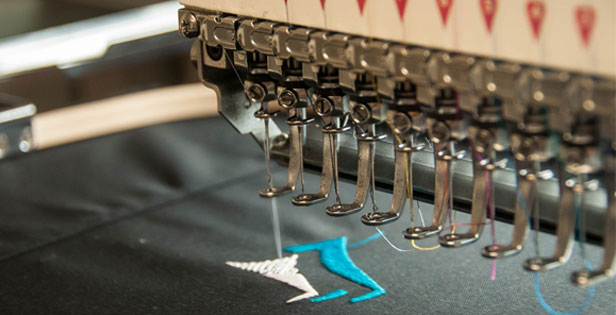Strategy October 11, 2018
How to Fix an Embroidery-Related Mistake
It’s 4 p.m. on Friday, the end of a really great week. Your machine is humming happily behind you, sewing out a sample shirt for that new corporate account you landed. You take the finished shirt off the machine to admire your work and realize that the logo colors are wrong.

What now? If you’re like most embroiderers, your reaction is to start picking out the thread so you can run it again. But that’s not always the best choice. First, analyze the situation by asking yourself the following questions.
How much will it cost to pick the thread out? Depending on the design, it could take quite a while to fix the problem. Picking out thread requires concentration, so it will divert attention away from an employee’s normal duties. If a machine operator has to concentrate on picking out thread instead of running a machine, that’s a loss of production. Or if you routinely bring in, say, $300 of sales in an hour’s time, but instead spend that hour repairing a shirt, that was a pretty expensive repair job.
Is the damaged item replaceable, and how much does it cost? The answers are important to know because some things can’t be replaced. For example, many customer-supplied garments come from unknown or unavailable sources. Also, the item could have been custom-made or an heirloom.
Even if you can source it, first evaluate the cost. For example, you should never pick the thread out of a cap that can be replaced for just a few dollars. On the other hand, a leather jacket might be too expensive to replace. Also, does the supplier have minimum order amounts? Will there be a COD charge? How much is freight?
One last thing to consider is whether there’s even a need to replace the garment. Let’s say a retailer orders 12 dozen caps. He probably doesn’t have to have exactly 144 pieces. Send him the good caps, subtract the cost of the damaged ones, and offer to replace them if he wants. The customer will probably be satisfied without the extras.
Is there a deadline? Obviously, if it’s 5 p.m. and the garment must be delivered by 10 a.m. the next day, it may be impossible to replace it. However, keep in mind that many discount department stores sell blank goods from brands like Hanes and Fruit of The Loom, and you may be able to obtain a quick replacement there. Also, if you live on the East Coast, you can still order next-day air delivery from a West Coast business up until about 7 p.m. ET.
How severe is the mistake, and can it be resewn successfully? Picking out thread is only half the battle. No matter how well you remove the original design, there will always be an image left behind, and you’ll need to cover it up. If the logo was a filled design, you can usually enlarge it slightly and carefully resew it over the image of the old one. But what if you mistakenly sewed the name Jonathan Alexander Jr. on a shirt for Joe Jones? You’d be hard pressed to stretch the short name wide enough to cover the needle tracks left by the original.
Also, remember that some mistakes can be remedied just by talking with the customer. If you sew the logo in the wrong place or make a minor thread color mistake, it may not be a serious problem. Recently, we sewed a batch of shirts with the logo on the left chest rather than the right (as specified by the customer). To help remedy the situation, we threw in some free caps. As it turned out, the client wasn’t too concerned with the incorrect logo placement, loved the caps and wants to order more. Discuss it with the customer. Even if you have to offer a discount, it’s simpler and cheaper than correcting the flaw, or replacing the garment.
The next time you have an oops, don’t rush for those fix-it tools first thing. Analyze the mistake and the possible solutions, then make your decision. And while you’re at it, make sure you determine what went wrong in the first place and correct that too.
Jimmy Lamb is an award-winning author and speaker with more than 25 years of experience in the apparel decoration business and is now the manager of communications at Sawgrass Technologies.
